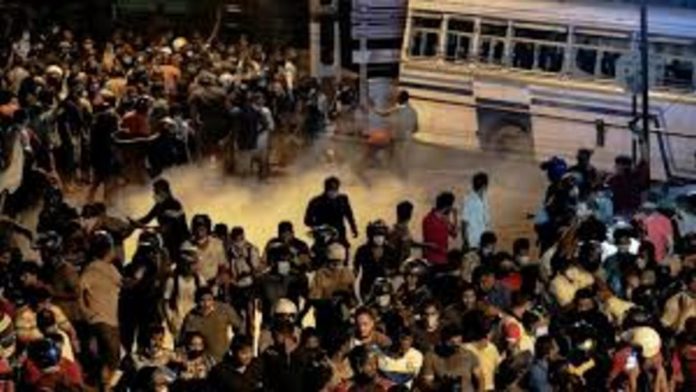Overnight curfews have been imposed in many parts of Sri Lanka’s capital city Colombo on Friday after massive protests against the handling of country’s worst ever economic crisis by the government.
Hundreds of protesters were gathered infront of President Gotabaya Rajapaksa’s residence in Colombo suburb and were thrashed by the police using water cannons and tear gas, said a witness.
A senior superintendent of Police, Amal Edirimanne said a curfew has been imposes in four divisions in country’s commercial capital, Colombo.
Some protesters on their way to Gotabaya’s residence vandalized a wall and threw bricks at the police and set a bus on fire.
The island has been experiencing 13 hours of rolling blackouts in a day because the government does not have enough foreign exchange for fuel imports.
As the government seeks to find a way to get out of the crisis, a spokesperson told that the International Monetary Fund (IMF) will negotiate with Sri Lankan diplomats on a possible loan programme in upcoming days.
The government has resorted to turn off street lights to save electricity as the continuing shortage of diesel is bringing more power cuts and has halted trading in the main stock market, said Power Minister Pavithra Wanniarachchi.
This power cut has just fuelled the pain of Sri Lankans as they are already suffering by the shortages of essentials and high prices.
Retail inflation hit 18.7% in March over similar period last year, the insights division said on Thursday. Food inflation reached at 30.2% in March, halfway determined by a currency devaluation and last year’s prohibition on chemical fertilizers that was subsequently turned around.
Dimantha Mathew of First Capital Research said the inflation is at worst level in more than a decade.
A diesel shipment on credit of worth $500 million is expected by Saturday from India, said Wanniarachchi. However she said it will not solve the issue.
“Once that arrives we will be able to reduce load shedding hours but until we receive rains, probably some time in May, power cuts will have to continue,” she further said adding “there is nothing else we can do”.
She also said that the water levels at reservoirs to run hydro-electric projects has also fallen to record low, while the demands has hit record high as the season turns to hot-dry.
This crisis is said to be a result of wrong-times tax cuts and the worst impact of coronavirus pandemic along with government’s historically weak finances that has led to a decrease in foreign exchange by 70% in last two years.




